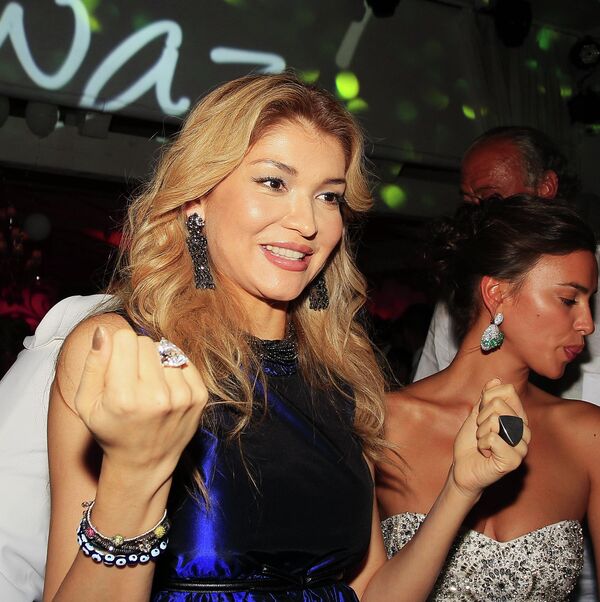MOSCOW, September 17 (RIA Novosti) - Gulnara Karimova, daughter of Uzbekistan’s President Islam Karimov, faces criminal prosecution as part of a massive investigation into the corruption and graft that her and her entourage engaged in.
Once considered one of the most powerful people in Central Asia, untouchable by authorities, Karimova’s number has finally been called in a criminal investigation which has been going on for over six months.
“The parts of the criminal case...for which it was impossible to collect all the necessary evidence have been allotted in a separate procedure...specifically, this includes the matter of Karimova G.,” a press statement released last week by the Uzbek Prosecutor General’s Office read.
Karimova and five associates face over 194 million USD in corruption and graft-related charges.
The 42-year-old, a self-proclaimed “poet, mezzo soprano, designer and exotic Uzbekistan beauty,” once had a business empire stretching throughout the country, holding assets in oil refining, gold and telecommunications (including mobile phone service providers, television and radio stations), as well as nightclubs. The latter were long-suspected centers of prostitution and transshipment points for the trafficking of women to Dubai.
Additionally, Karimova dabbled in pop music, producing lip-synced videos under the stage name “Googoosha”. She also had her own line of jewelry, clothing and perfume products, which she promoted in chic boutiques across Europe and the United States. She held the title of professor at the Tashkent University of World Economy and Diplomacy, served as Uzbekistan’s official U.N. representative in Geneva, and promoted herself as the chief philanthropist in her country.
Last year, Karimova had an apparent falling out with her family, including her father. She lost her UN post, and the diplomatic immunity that came with it, and came back to Tashkent in September 2013.
In October, the accounts of companies linked to her were frozen, and her television and radio stations were taken off the air. Thereafter she began publishing her frustrations via the social media, suspecting the head of the Uzbek National Security Service of having turned her father against her, and accusing her mother and estranged sister of “dabbling in witchcraft”.
In February 2014, Karimova was placed under house arrest, and her internet communications stopped. Simultaneously, over a dozen of Karimova’s entourage were arrested and charged with blackmail, extortion and forgery on a massive scale. The group of 15 was prosecuted in May, and given 7-10 year prison sentences. The group includes Rustam Madumarov, the business partner and reported boyfriend of Karimova, and Gayane Avakyan, a female friend and associate who became infamous in a bribery scandal involving Swedish-Finnish telecom company TeliSonera and a 300 million USD payment to enter the Uzbek telecom market.
Referencing the earlier prosecutions, the Prosecutor General’s Office’s statement said that between “2011-2013 members of the organized group inflicted especially large-scale damage to the state under the guise of business.” The crimes included the purchase of state assets at undervalued rates, embezzlement and the misappropriation of state assets. Uzbekistan Airways, the Fergana oil refinery and the Coca-Cola Uzbekistan joint venture were listed among the crooked business dealings, the value of which was estimated at over 67 million USD.
A total of 180 people and organizations are said to have been investigated over the last six months by Uzbek prosecutors. The Prosecutor’s Office said in last week’s press release that “as of now, criminal cases regarding most of the members of the organized group have been sent to court.”
Karimova already faces corruption and money-laundering charges throughout Western Europe and the United States. Swiss authorities noted in March that investigations of “alleged illegal acts...in the telecommunications market in Uzbekistan” had yielded $915 million in frozen assets in Switzerland. Eight other countries are also seeking to bring her up on corruption charges.
In the United States, she faces kidnapping charges, after she fled with her US-born daughter following a failed child custody battle with her former Afghan-American husband.
Since her house arrest, Karimova has reported in letters, which have been smuggled out of Uzbekistan, that she was undergoing “severe psychological pressure,” “persecution, starvation and abuse.” This week, a London-based PR firm hired by Karimova released photos of her house arrest.
“She paints herself as a victim,” noted Ferghana.ru editor Daniil Kislov, adding that he believes that Karimova is being punished by her father for a long history of excesses, and for damaging the country’s reputation among foreign investors.
Experts have said that Karimova’s downfall was long in the offing, and pointed to the upcoming 2015 elections and rumors of 75-year-old Islam Karimov’s retirement as one potential reason why her reckoning may finally be here. Karimova had once been speculated as a possible successor to her father, who has been in charge of the country since 1989.
Wikileaks cables going back to the period between 2005 and 2010 had noted that “most Uzbeks see Karimova as a greedy, power-hungry individual,” a “robber baron,” and “the single most hated person in the country.”
Central Asia expert Azhdar Kurtov told Rossiya Segodnya that “There is almost certainly a connection” to the power games taking place ahead of the elections. “Islam Karimov is aging. The moment when he will be forced to leave his post out of physical necessity is approaching. And, understanding this, Karimov cannot but think about the future of the country,” Kurtov said. “In this regard, of course, this scandal of his out-of-control daughter, which has led to a split within the political elite...is unnecessary,” he added.
Kurtov noted that the criminal case against Karimov’s daughter is not only a necessity, but “even positive for the president,” since “voters usually value when the head of state does not shield anyone from justice...even if it is a member of his family.” He notes that it is beneficial to the majority of the Uzbek elite, and that Karimova’s removal from the political field will mean greater political stability in the future.


